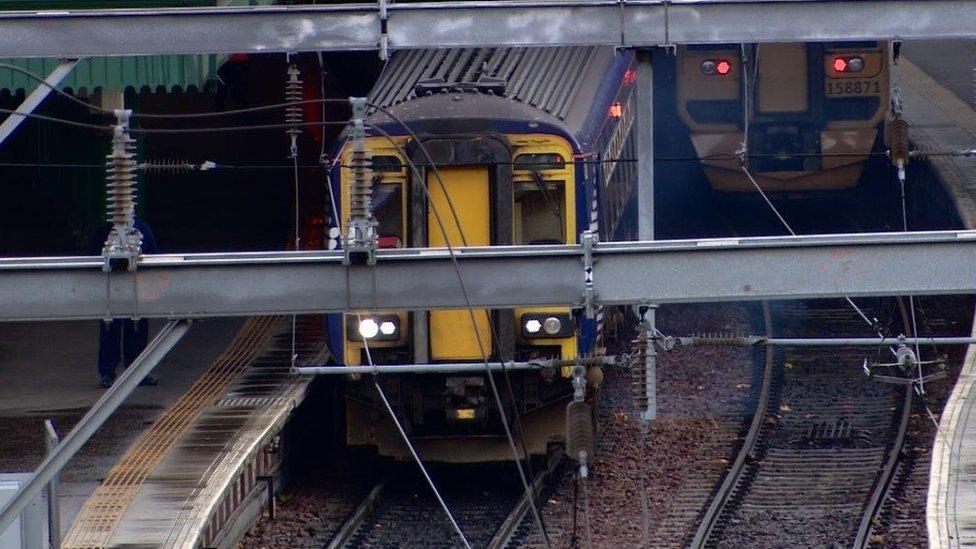Team Dugdale do the loco commotion
- Published

The early-morning breakdown between Waverley station and Haymarket affected services
What a way to run a railway. That, pared to its essence, was the challenge posed at Holyrood by Labour's Kezia Dugdale. It followed widespread disruption to the ScotRail network caused by a single train failure at a key junction in Edinburgh.
Want to know how that Parliamentary challenge emerged? Early this morning, one of Ms Dugdale's more senior and enthusiastic staffers found himself in the Labour corridor, alone and palely loitering.
Pretty well everyone else, it seems, had been delayed. By the train problems. If it was afflicting Team Dugdale, went the thinking, it must be infuriating a lot of folk.
Hence the challenge to the first minister. Rather powerful, as it happens. Plus, of course, Ms Dugdale has raised this particular topic more than once.
Indeed, in pursuing the question, she has been prepared to risk a reputation as a trainspotter (the zealous kind, that is, not the Leith version depicted with brutal brilliance by Irvine Welsh.)
Further, in having a go at rail services, Labour has appeared to focus, personally, upon the transport minister Humza Yousaf. Today, for example, Ms Dugdale suggested that travellers had lost confidence in him.
Puzzled commuter
Politically, one understands her approach. It makes an Opposition attack more pointed if it can be aimed at an individual. I doubt, however, whether a puzzled commuter, peering gloomily through the mist at Drumgelloch station, would be cursing Mr Yousaf.
Such a thwarted individual, I would contend, is more likely to be unhappy with ScotRail and the Dutch company, Abellio, the contract operators since last year.
Certainly, Nicola Sturgeon shared their pain. She apologised. She said that ScotRail had apologised. And she went on to remind the chamber of options.
The contract is scheduled to last until 2025. But there is a midway review and also the contract could be terminated early, if performance fell to a particular point over a specified period.
Plus Ms Sturgeon reminded MSPs that her administration had now secured the prospect of a public sector bid - something which was forestalled when the contract was granted to Abellio. The FM noted acerbically that a former Labour UK government had refused to grant such leeway to Scotland.
Ms Dugdale was undeterred. She challenged the FM to act. Ms Sturgeon said she was ready to intervene, if necessary, while also stressing that it would be wrong to judge the entire service by a single, exceptional incident.

For her part, Ruth Davidson of the Tories may be wishing that she had stayed on track. Admittedly, it is unlikely she would have been demanding renationalisation, as Ms Dugdale did. But it might have offered the merits of topicality.
Instead, Ms Davidson pursued a questioning strategy which must have seemed a wizard wheeze on paper - but struggled, just a little, just a tiny fraction, in the caustic atmosphere of political debate.
She reminded Ms Sturgeon that she had been in office as FM for two years. After a rousing chorus of Happy Birthday, the chamber settled down to await the "but".
It swiftly arrived (rather more swiftly than trains in Scotland.) Ms Sturgeon, it appeared, was responsible for widespread calamity, ranging from apprenticeships to schools to welfare and pretty well everything else. No doubt it was simple lack of time which prevented the Tory leader from blaming the FM for Scotland's rotten showing at Wembley.
Snag is Ms Sturgeon had a pretty robust riposte on hand for each and every sally. Plus it turned the interrogation into a clanjamfrie of topics, rather than a focused attack.
However, there was a substantive exchange on the social security powers being devolved to Scotland - but now, at the Scottish government's request, to be shared with Whitehall under "split competence" up to or until 2020.
'Simple common sense'
Given the SG's eager demands for the devolution of more powers, particularly in the field of benefits, was this not, asked Ms Davidson, a "massive screeching U-turn"?
Nothing of the sort, insisted the FM. It was simple common sense to ensure that systems were in place to protect recipients. Indeed, the relevant minister Jeane Freeman told me in an interview that partial devolution - as distinct from full, independent control - added to the complexity.
There was less heat in the exchanges with other leaders - but substantial significance for all that. Patrick Harvie of the Greens reminded MSPs that control over abortion is being devolved to Holyrood.
He asked Ms Sturgeon to examine how the health service in Scotland might assist women from Northern Ireland - where the law is very different - to gain access to abortion services in Scotland. Ms Sturgeon replied solemnly and with sympathy.
For the Liberal Democrats, Willie Rennie pursued a topic he has made his own, through diligence and persistence: the issue of mental health services.
Mr Rennie noted that professionals had voiced wide-ranging concern about the SG's draft mental health strategy. The FM, he said, should listen and respond.
Ms Sturgeon, disarmingly, agreed. The strategy was in draft form precisely because it was intended to draw upon expertise from professionals in the field. Hopefully, the final version would address their concerns. Be assured that Mr Rennie will return to the topic, if not.
- Published17 November 2016
